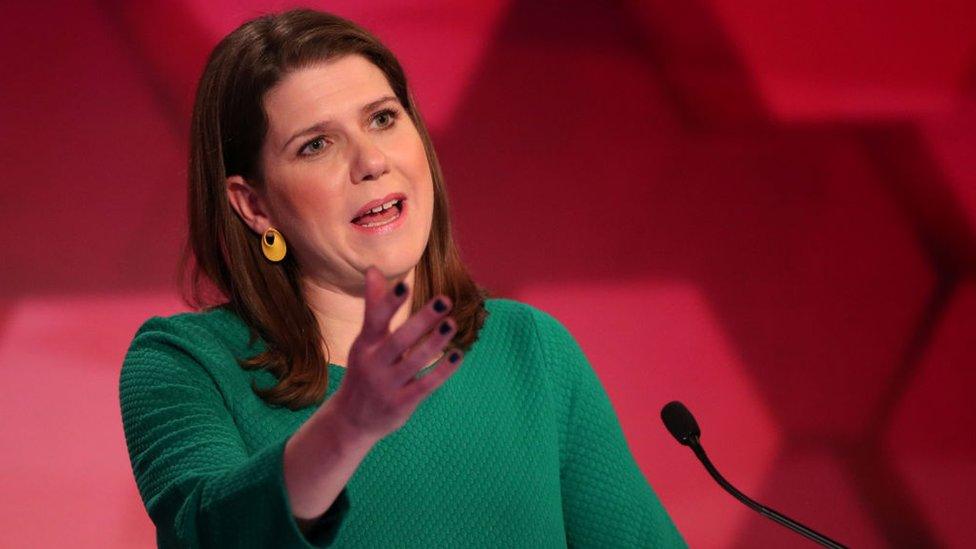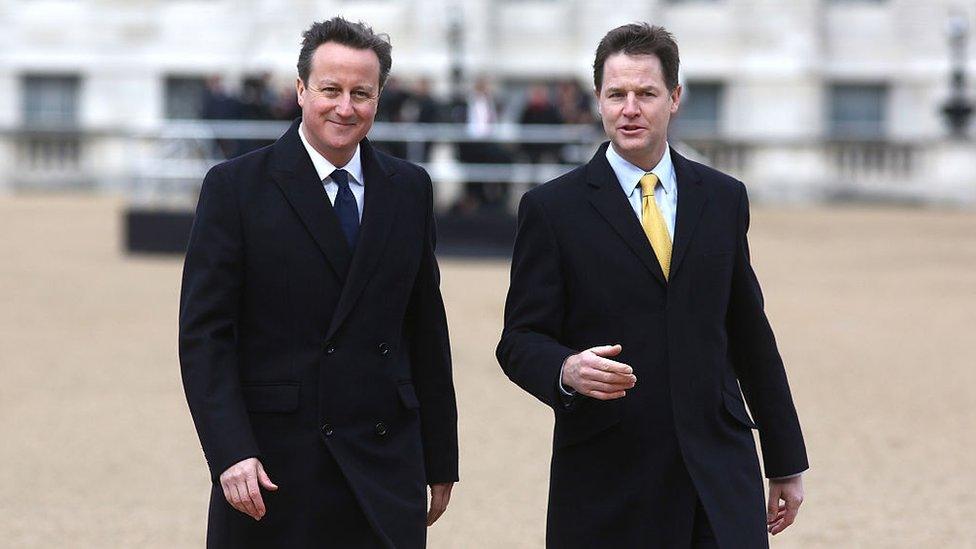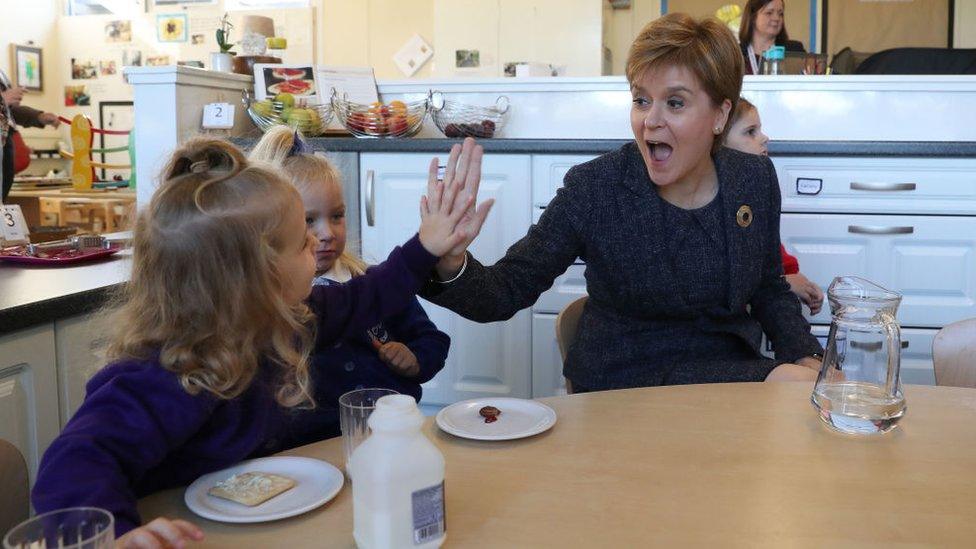General election 2019: Who’s listening to the Liberals?
- Published

The TV debate format has put Jo Swinson on the defensive
Jo Swinson's campaign has got bogged down in questions about the campaign itself, and messages about the manifesto have struggled.
Spending plans are ambitious, notably on childcare, but less so than Labour. There would be funding consequences for Holyrood, and some vague talk of "alignment".
Among the big themes for change is much that would affect business, including a shift towards stronger employment rights.
"In the brighter Liberal Democrat future, children will be happier".
Liberal Democrats have produced a meaty set of policy proposals in their manifesto. The question for them in this election campaign remains: Is anyone listening?
The dynamics of the campaign have given Jo Swinson less opportunity to match the two lead contenders for occupancy of 10 Downing Street.
One or two-dimensional messaging on nightly news programmes has left her only the opportunity to sound strident about being against Brexit.
It's been acknowledged that starting the campaign with talk of Ms Swinson being prime minister failed the credibility test. It has become, perhaps literally, a self-defeating assertion.
On those TV occasions the Lib Dem leader has had the opportunity to talk at greater length, the format has put her on the defensive about the 2010-15 coalition led by David Cameron with Nick Clegg.
Pinned down
The demands for self-flagellation continue, featuring again this week when the leader was quizzed by Andrew Neil on BBC1. The other dominant issues were her poll ratings, potential deal-making options and if she'd resign after a poor result.
The party has been pinned down to process, analysing the campaign itself. Even the proposal to legalise and tax cannabis (drawing the Scottish government and others into making UK drugs policy) fails to raise an eyebrow.
Labour now says it took the Lib Dem challenge too seriously and the Tory one not seriously enough. That may have damaged Labour prospects: the polls suggest it has also hit Lib Dems. And between them, the anti-Brexit vote is being divided.
What, though, of the Lib Dem manifesto? It's not short of ambition, particularly when it comes to spending on childcare. Spending in England would rise five-fold.

The 2010-15 coalition led by David Cameron with Nick Clegg is still causing issues for the Liberal Democrats
It has a set of ambitions for reform of the way business works that is quite a long way along the road to Labour policy, without the nationalisation, the prominent role for trade unions or the corporate tax grab.
They're far from business friendly. Take, as two examples, the "Worker Protection Enforcement Agency, to protect those in precarious work", and a new employment status of "dependent contractor", somewhere between employment and self-employment, with rights to minimum earnings, sick pay and holiday entitlement. If you're on a zero hours contract, Lib Dems want to add 20% extra on minimum wages to compensate for uncertainty.
Reporting is required on environmental impact. There are plans for nutrition information on restaurant menus that will infuriate restaurant owners; a big hike in air passenger tax (more on that later) would clip the wings of frequent flyers and air travel generally.
Yet the manifesto seeks to assert that the Lib Dems are "the party of business". They want to "reinvent the relationship" between business and communities.
Grey areas
Procurement on a grand scale, much of it infrastructure to address climate change, should be the friend of firms and workers getting those contracts. And there's much being said about innovation.
As with Labour and the Conservatives, many of Jo Swinson's campaign promises would not affect those who live in the East Dunbartonshire constituency she hopes to retain on 12 December.
Much of it is devolved to Holyrood, yet there are some grey areas about the reach of the childcare offer. It would "align with Scotland". Some aspects of these reforms may be delivered through bits of the tax and welfare system that remains reserved to Westminster.
There are some big potential impacts. If, as proposed, Westminster's income tax goes up 1p in the pound at every level, the funding mechanism for Holyrood will kick in. It ensures that the gains from taxing more people in other parts of the UK do not accrue to Scotland. (The same rule applies in reverse.)
So in those circumstances, around £500m would be lopped off the block grant. It would go some way to closing the gap in NHS spending, with Scotland having been consistently ahead.

Childcare legislation is devolved to Nicola Sturgeon's SNP government at Holyrood
That is assuming the current funding structure lasts. It is up for review during the next Westminster parliament. And Lib Dems are promising Welsh voters they will revise upwards their share of Westminster spending with a revision to the Barnett formula. There would surely be pressure to look at allocations to Scotland and Northern Ireland, and neither can expect to gain from such a re-think.
The manifesto proposal for Air Departure Tax would have a more dynamic effect than income tax. A huge hike for frequent flyers, while cutting it for the occasionally airborne, would open up options for Holyrood: to follow suit with Air Passenger Duty, for the same environmental reasons, or to retain current levels.
The latter choice would encourage passengers to divert highly-taxed routes and frequent flyers through Scottish airports. Dublin Airport, without air passenger duty, already benefits from that.
In the half-hearted battle between parties to look fiscally credible, Lib Dem spending plans sit, appropriately, between Labour and Conservative. They have the distinction of aiming, at least, at a surplus on non-capital spending.
They do so by some questionable methods. The big one is to factor in the potential for a "Remain Dividend" - assuming an abandonment of Brexit would bring about a rise in the economic growth rate, and tax revenues would surely follow.
Undeclared tax
It's a reasonable assumption, but hard to make hard forecasts based on it, and by 2024-25, £14bn of tax revenue is supposed to be coming into the Treasury as a result.
Another is to link sources of tax revenue with spending priorities. That has attractions in campaign terms, but makes limited sense in government. If the priority requires more or less than the tax revenue raised, it would be unwise to take such an inflexible approach.
A further one is our old friend, the improved collection of undeclared tax. No manifesto is complete without a bold claim for what can be achieved.
But for all their tendency towards the middle-of-the-political-road, Lib Dems like to feel bold. Not only can Jo Swinson become prime minister, we're told, but according to this manifesto: "In the brighter Liberal Democrat future, children will be happier".
